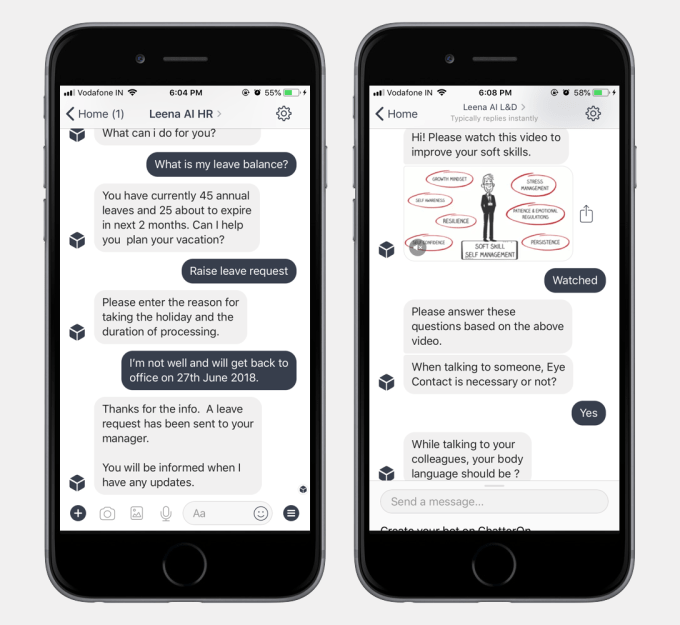Leena AI, a recent Y Combinator graduate focusing on HR chatbots to help employees answer questions like how much vacation time they have left, announced a $2 million seed round today from a variety of investors including Elad Gil and Snapdeal co-founders Kunal Bahl and Rohit Bansal.
Company co-founder and CEO Adit Jain says the seed money is about scaling the company and gaining customers. They hope to have 50 enterprise customers within the next 12-18 months. They currently have 16.
We wrote about the company in June when it was part of the Y Combinator Summer 2018 class. At the time Jain explained that they began in 2015 in India as a company called Chatteron. The original idea was to help others build chatbots, but like many startups, they realized there was a need not being addressed, in this case around HR, and they started Leena AI last year to focus specifically on that.
As they delved deeper into the HR problem, they found most employees had trouble getting answers to basic questions like how much vacation time they had or how to get a new baby on their health insurance. This forced a call to a help desk when the information was available online, but not always easy to find.
Jain pointed out that most HR policies are defined in policy documents, but employees don’t always know where they are. They felt a chatbot would be a good way to solve this problem and save a lot of time searching or calling for answers that should be easily found. What’s more, they learned that the vast majority of questions are fairly common and therefore easier for a system to learn.
Employees can access the Leena chatbot in Slack, Workplace by Facebook, Outlook, Skype for Business, Microsoft Teams and Cisco Spark. They also offer Web and mobile access to their service independent of these other tools.

Photo: Leena AI
What’s more, since most companies use a common set of backend HR systems like those from Oracle, SAP and NetSuite (also owned by Oracle), they have been able to build a set of standard integrators that are available out of the box with their solution.
The customer provides Leena with a handbook or a set of policy documents and they put their machine learning to work on that. Jain says, armed with this information, they can convert these documents into a structured set of questions and answers and feed that to the chatbot. They apply Natural Language Processing (NLP) to understand the question being asked and provide the correct answer.
They see room to move beyond HR and expand into other departments such as IT, finance and vendor procurement that could also take advantage of bots to answer a set of common questions. For now, as a recent YC graduate, they have their first bit of significant funding and they will concentrate on building HR chatbots and see where that takes them.

Comments
Post a Comment